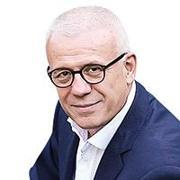Do votes increase 8 pct in Turkey on pride stoking political acts?
Paylaş
Which one of these three "political acts" has stoked the pride of the Turkish nation more?
The capture of PKK terrorist leader Abdullah Ocalan? Or the storming out of a session in Davos? Let's look to the following shift in voter support after these three political acts. Public support for deceased former Prime Minister Bulent Ecevit, who led a coalition government during Ecevit's party gained 41.39 percent of the vote in the 1977 elections that immediately preceded this operation. He would easily hold the parliamentary majority based on the current election system, had this system existed at that time. But, he was unable to claim to be the ruling party due to past election system. According to these figures, support for his party increased for 8 percent by the second election. Ecevit was once again leading a coalition government in 1999 with 14.64 percent voter support, when Ocalan was captured in Ecevit's party gained 22.19 percent the vote in elections that followed, revealing an 8 percent rise, and formed yet another coalition government. The result being: These two political incidents, which are seen as important achievements in Turkish history that greatly stoked the pride of the public, could be the viewed as reason for the 8 percent increase in votes. It is also possible to perceive an increase in "votes of pride", if you take into consideration the deterioration of the ruling party. * * * We are now faced with another incident. Prime Minister Erdogan's storming out the session after delivering his final scathing opinion... Now, it is expected that this move will solidly "transform to votes". This is the expectation of many, including myself. Are these expectations grounded on any scientific data? No. At present it is only a "sentiment"; the real results will be seen in the elections. I am extremely curious what the answer to this question will be: To what extent will the "Davos act" affect support for Erdogan? The reason for my curiosity: Ecevit took back part of This was practically the first addition of land for the Turkish nation that had been losing its lands since the 18th century. The return of Ocalan, was seen as a move to capture a gang leader that was plotting to take Turkish lands. In other words, both incidents were related directly to Turks and * * * But Erdogan's move in Davos is not related to an issue that interests us directly. Of course, we were all shocked and saddened by the violence in But, regardless of how you look at this issue, the problem is not directly related to us. Many innocent children and citizens of various nations are being killed around the world each day. The This is the point that complicates my interest in this. I wonder if Erdogan's action in Davos has stoked our pride more than the other two incidents. And if this is the case, is the cause more psychological or sociological. What is the connection that has lead to such widespread support? Has our "national consciousness" heightened or contracted? Another question is this: I also wonder if support for Erdogan’s reaction is based on a response to the situation in * * * In the end, there are two things I am curious about with regard to the coming bi-elections on March 29. Will the real debates in the community, including the cleaning up and beautification our cities and towns, be of secondary importance as was seen in previous elections? How much of an affect will Davos have on the outcome of the elections if it is the primary debate? Of course there is another issue: Where should we look for the real reason if Erdogan achieves a sizable increase in support? In psychological or sociological factors? In other words, why a win in Davos would bring more votes than victory in Or, is It is an interesting puzzle, isn't it? *
Paylaş








